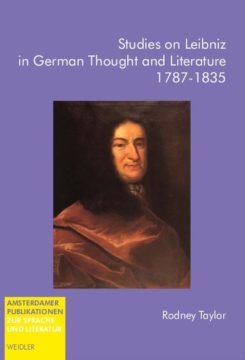Leibniz’s metaphysical system exerted a profound influence on German writers and thinkers well into the Twentieth century. However, many fascinating dimensions of this complex influence remain virtually unexplored. The object of the present study is to discuss the manifold modifications and permutations of Leibniz’s influence as it appears in works by Herder, Fichte, Hölderlin, Novalis, Büchner and Feuerbach. In the philosophical and/or literary writings of theses authors, significant aspects of Leibniz’s system are re-interpreted and refashioned to comply with an author’s particular aesthetic or metaphysical intention. The study analyzes and elucidates the kaleidoscopic ways in which the author under consideration achieved their creative purposes with regard to their reconstructions of Leibniz’s doctrines. A Fichte, for example, refashions Leibniz’s theory concerning the soul’s autonomy with the aim of projecting a utopian vision of historical evolution, while a Büchner transmogrifies Leibniz’s doctrines in order to develop a dark parody of his “best of all possible worlds” metaphysic. An intriguing aspect of the intellectual history addressed in this study concerns the manner in which the aforementioned writers and thinkers approach the nature anthology of Spinoza in the context of Leibniz’s idealism. The impetus of the study is interdisciplinary, inasmuch as it explicates manifold areas in which literature and philosophy overlap and, with regard to the field of intellectual history, endeavors to illuminate dimensions of the Zeitgeist in which the authors that it treats were active.
- Veröffentlicht am Freitag 11. Februar 2005 von Weidler Buchverlag Berlin
- ISBN: 9783896934222
- 259 Seiten
- Genre: Aufklärung, Hardcover, Philosophie, Renaissance, Softcover
